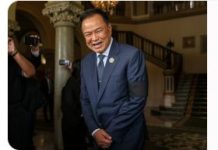NEW YORK, APR 5 (DNA): Owing to the increased attacks from terrorists operating from Afghanistan, Pakistan has urged the United Nations to recover and prevent weapons’ access to such groups such as the banned Tehreek-e-Taliban Pakistan (TTP), Balochistan Liberation Army (BLA) and Majeed Brigade.
“Terrorist armed groups are in possession of billions worth of illicit arms abandoned in Afghanistan, which are being used in violence against civilians and armed forces of Pakistan,” Counsellor at the Pakistan Mission Syed Atif Raza said at the “UNSC Arria-Formula meeting on Small Arms and Light Weapons Management in UN Sanctions Regimes” on Saturday.
The diplomat’s remarks come against the backdrop of a new report by the Geneva-based “Small Arms Survey” which highlighted the illicit proliferation of small arms and light weapons continues to be a significant concern along the Afghanistan-Pakistan border.
The report, titled “Documenting Arms Availability in Afghanistan”, highlights the ongoing arms trafficking in the region, revealing that both Soviet-era and NATO-pattern weapons remain accessible in informal markets despite efforts by the Taliban to control arms distribution.
The findings show that weapons are regularly diverted to non-state armed groups, including the TTP and al-Qaeda, raising concerns about regional security.
The survey is to be interpreted and taken against the context of the Global Terrorism Index 2025 report which not only places Pakistan as the world’s second-most terrorism-affected country in 2024 with an alarming 45% surge in terrorism-related deaths but also echoed Pakistan’s repeated stance on the use of Afghanistan’s territory by the TTP.
Noting that the militant groups operating from Afghanistan have intensified their attacks, particularly along the Pakistan-Afghanistan border, the report said that the TTP remained the deadliest terrorist group in the country, accounting for 52% of all terrorism-related deaths.
Furthermore, the country has been reeling under increased terrorist attacks targeting law enforcers and security forces since the Taliban returned to power in Afghanistan in 2021, particularly in the bordering provinces of Khyber Pakhtunkhwa and Balochistan.
Pakistan witnessed a sharp increase in terror attacks in January 2025, surging by 42% compared to the previous month, according to data released by the Pakistan Institute for Conflict and Security Studies (PICSS), a think tank.
Building upon his arguments in this regard, Counsellor Raza highlighted that small arms and light weapons have become instruments of choice for state and non-state actors to destabilise any country or region through fuelling conflict and support to illegal armed groups, organised crime and terrorism.
“These concerns are further compounded with the increasing sophistication of illicit arms and access to modernised weapons at the disposal of illegal armed groups often operating across national boundaries.”
Pointing out the threats faced by Islamabad, the diplomat said: “Pakistan is concerned at the acquisition and use of modern and sophisticated illicit arms by terrorist groups such as TTP — a UN-listed terrorist organisation, which operates with impunity from Afghanistan — as well as the so-BLA and Majeed Brigade”.
“We call upon our international partners to recover the vast stockpile of abandoned weapons, prevent their access to armed terrorist groups and take measures to close this thriving black market of illicit arms,” he added.

















